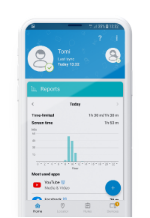In our present digital age, where social media platforms are a hub for connection, it's crucial to understand the implications of oversharing, particularly for our kids. With the advent of numerous social media platforms, children are increasingly sharing their lives online, sometimes revealing more than they should or want, leading to a phenomenon known as 'Too Much Information' (TMI).
The question we must ask ourselves is, "How can oversharing impact the future lives of our kids?"
Oversharing and Its Consequences
Oversharing refers to the act of sharing excessively personal or detailed information online. It's akin to leaving digital footprints that can be traced back, forming a comprehensive picture of a person's life. For kids, the consequences can be significant, ranging from damaged reputations to potential privacy breaches and cyber threats.
One of the key impacts of oversharing is on future opportunities, particularly in education and employment. Colleges and employers increasingly vet potential candidates through their online presence. Kids who overshare personal information, engage in inappropriate behavior online, or share controversial opinions can find their prospects hindered. An inappropriate post from the past can paint an unfavorable picture, leading to missed opportunities.
Oversharing can also lead to serious privacy and security concerns. Personal information like addresses, school locations, or family details can be misused by cybercriminals, leading to risks like cyberstalking, identity theft, or cyberbullying. Oversharing about one's mental state, can lead to misuse of information by online predators, making kids more susceptible to grooming. In extreme cases, oversharing can even lead to real-world threats.
Psychological Impact
The psychological impact of oversharing cannot be overlooked. Kids who share every aspect of their lives online can become overly dependent on social validation, leading to anxiety, depression, and low self-esteem. They might also struggle with forming genuine, real-life connections due to their dependence on digital interactions.
To read more about a psychologist's perspective, read an interview with Jarmila, Tomková on this link.
What can parents do
To mitigate these risks, kids need to be educated about the potential consequences of oversharing. This education has to start in the family and later be strengthened in school. They need to understand that the internet never forgets and that what they share today can impact their future or even the present.
- Set Social Media Guidelines - Set rules about what is okay to share online. Discuss the potential risks and encourage your child to think twice before posting.
- Teach Digital Literacy - Teach your child to differentiate between what's appropriate and inappropriate to share online. Encourage them to maintain a positive digital footprint.
- Privacy Settings - Ensure your child's social media accounts are set to the highest privacy settings. This limits what can be seen and by whom.
- Encourage Offline Interactions - Promote real-life interactions and hobbies that don't involve oversharing online.
- Create a safe space – Encourage your kids to share their feelings offline rather than online in a safe environment.
Social media can be a great tool for connection, it's vital to understand the potential pitfalls of oversharing. As parents and educators, it's our responsibility to guide our children to use these platforms responsibly, ensuring a safer digital future for them.


